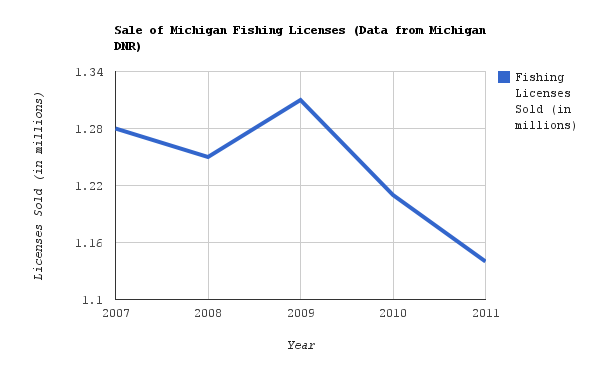By PATRICK LYONS
Capital News Service
LANSING — Project FISH is focused on teaching a new generation of anglers, hoping to reverse the decline in the sale of Michigan fishing licenses.
The project teaches water ecology, fishing techniques, rules and ethics of fishing and other skills like cleaning and cooking.
A Project FISH — Friends Involved in Sportsfishing Heritage — workshop will be held March 6-7 in East Lansing.
Project FISH was started in 1995 by the Department of Natural Resources (DNR), Michigan United Conservation Clubs and the Great Lakes Fishery Trust, said Mark Stephens, the education program coordinator. Since then the program has spread to 37 other states. The program which supports teacher development and is funded through donations and the sale of fishing equipment online.
Stephens said Project FISH also educates parents, because if parents are comfortable fishing they’re more likely to take their children fishing.
Stephens encourages young anglers to purchase licenses to promote stewardship of the state’s waters because license fees go toward funding the DNR and keeping water clean.
Anglers under 17 don’t need a license, but may purchase a youth license for $2. The federal government supplements that fee bringing in a total of $6 to the DNR, said Jim Dexter, acting chief of the department’s Fisheries Division.
Adult license sales have decreased by 10 percent over the past five years Dexter said.
Currently, the fee is $15 for a license that does not cover trout or salmon and $28 for an all-species license.
The department is partially funded through hunting and fishing license fees and the excise tax from the sale of hunting and fishing equipment. Dexter said that revenue to the DNR has also been decreasing because people are buying less outdoor equipment, and participating in fewer outdoor activities.
“That is significant because these licenses provide a vast majority of the funding for the DNR to operate and there have been budget reductions every year for several years now,” Dexter said. “Research has been showing that there is not as much free time in 2012 as there was in 1960. People are working longer so they have less time to do those things with their children.”
The DNR will host its annual Free Fishing Weekend June 9-10. All license fees are waived for the weekend, encouraging people to experience fishing.
The loss of funding has forced the DNR to reduce maintenance at its fish hatcheries and conduct fewer environmental surveys, but it has not cut back on stocking lakes and streams, Dexter said.
The price of licenses hasn’t increased since 1997, which has further strained the DNR budget as operating costs have risen, Dexter said.
Dan Thomas, president of the Great Lakes Sport Fishing Council in Elmhurst, Ill., said it is important to get kids hooked on fishing for a number of reasons.
“It gets them started on something that is enjoyable and it’s a good pastime,” Thomas said. “And number two, they won’t have time to run the streets and get involved with bad things.”
Dexter said that getting children involved early is important to creating lifelong anglers.
“It’s the rare person that started fishing or hunting when they were 28 years old,” Dexter said. “Most of the people who have been doing it for a long time got started learning from grandpa, or their dad. Things like Project FISH are designed to introduce newcomers to the recreational activity and hopefully get them hooked.”
Although the number of anglers has declined, Michigan still boasts some of the best fisheries in the country, experts said.
Thomas said because Michigan is surrounded by the Great Lakes and has a large number of quality inland lakes, it is unique in the region.
And Dexter said that the state has 20,000 miles of designated trout streams and some of the best steelhead trout fishing in the world.
© 2012, Capital News Service, Michigan State University School of Journalism. Nonmembers cannot reproduce CNS articles without written permission.

Spartan Newsroom - News and information from student journalists at the Michigan State University School of Journalism
Spartan Newsroom (https://news.jrn.msu.edu/2012/02/teach-a-child-to-fish-and-well-you-know-the-rest/)